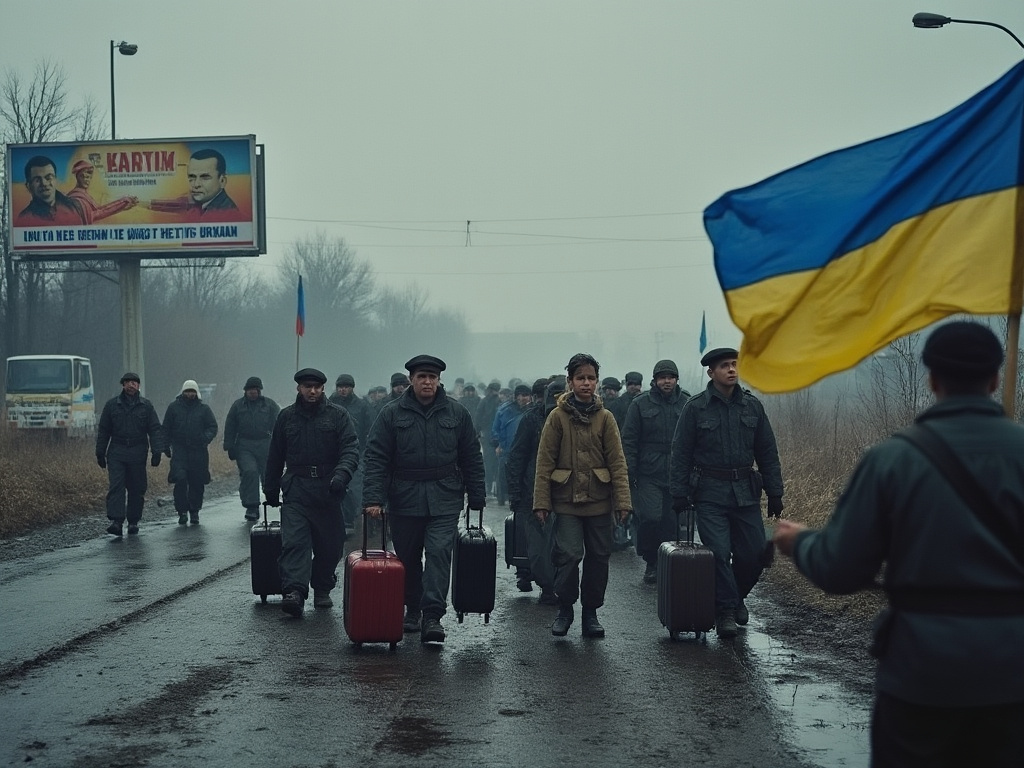A New Exodus: From Moscow to Mariupol
In a twist of irony that even the most imaginative satirist could scarcely dream up, Ukraine—once a nation under siege by Russian forces—has become a sanctuary for a growing number of Russian refugees. As Kyiv’s counteroffensive continues to push deeper into Russian territory, the liberated towns are seeing an influx of desperate Russians seeking safety from the iron grip of the Kremlin. Apparently, fleeing to Ukraine has become the unexpected trend of 2024.
What started as a trickle has now turned into a flood. Russian citizens, once spoon-fed tales of Ukrainian Nazis and Western decadence, are now packing their bags and heading straight for the very country their government demonized. The reason? Safety, of course. With Ukrainian forces now holding over 70 settlements in the Kursk region alone, these once-hostile territories have been transformed into safe havens, free from the creeping shadows of Moscow’s surveillance state.
In Belgorod and Bryansk, residents have been evacuating en masse as Ukrainian troops advance, leaving behind not just their homes but the suffocating propaganda that has kept them in fear. It seems the lure of a functioning society—one where drone strikes aren’t a daily occurrence and food isn’t rationed—has proven too strong to resist.
The Kremlin’s Quandary: Keeping Citizens Out
In a bizarre turn of events, Russia now faces a refugee crisis of its own making. The Kremlin, ever paranoid about losing control, has scrambled to prevent this exodus, sealing borders and setting up checkpoints to stop its own citizens from crossing into Ukrainian-controlled areas. The logic? If you can’t keep them in with propaganda, keep them in with barbed wire.
This strategy, however, seems to be as effective as a screen door on a submarine. Reports are surfacing that despite the best efforts of Russian border guards, many are slipping through the cracks, finding their way to the relative peace of Ukrainian-controlled towns. Once there, these refugees are greeted not with the hostility they’ve been conditioned to expect, but with open arms and a hot meal. Ukraine, it turns out, is more than willing to provide sanctuary to those fleeing Putin’s dystopian vision of a resurrected Soviet empire.
The New Face of Liberation: Tanks and Tea
As Ukrainian forces continue their advance, the newly liberated towns are quickly being repurposed. Tanks roll through the streets, but instead of shelling buildings, they’re delivering aid. Soldiers, once seen as invaders by the Russian populace, are now welcomed as liberators. In a deliciously ironic twist, Ukraine’s military isn’t just freeing territories; it’s freeing minds.
In towns like Sudzha and Rylsk, formerly under the oppressive thumb of Moscow’s influence, Russian citizens are learning what life is like without the constant barrage of state-sponsored paranoia. Schools are reopening, but now the curriculum includes critical thinking and history that doesn’t start with “Once upon a time, in glorious Mother Russia…” Hospitals, once neglected under Russian occupation, are now staffed and supplied. The fact that these supplies are often confiscated Russian goods only adds a certain poetic justice to the situation.
Russian State Media: Turning the Screws
Back in Moscow, the Kremlin’s spin doctors are working overtime. State media is caught in the unenviable position of having to explain why so many Russians are fleeing to the very country they were told was a den of evil. Their solution? Double down on the narrative, of course.
Russians fleeing to Ukraine, according to state TV, are either deluded by Western propaganda or outright traitors. In a broadcast that would be comical if it weren’t so tragic, one news anchor described these refugees as “victims of a psychological operation” carried out by NATO. Yes, the very same NATO that Russia has been so desperate to join in recent weeks. Apparently, when reality doesn’t fit the narrative, just make up a new reality.
A Future Rewritten: From Conquerors to Refugees
As more Russian citizens find refuge in Ukraine, the implications for the future are staggering. What began as a war of conquest has, for Russia, become a war of survival. The Ukrainian counteroffensive, initially seen as a bold but desperate move, has now turned into a full-blown reversal of fortunes.
For Ukraine, this is more than just a military victory; it’s a cultural one. Every Russian who crosses the border into Ukrainian-controlled territory is a testament to the failure of the Kremlin’s narrative. Every liberated town is a nail in the coffin of Putin’s imperial ambitions. And with each passing day, the line between liberator and refugee becomes ever more blurred.
In the end, what was supposed to be a triumphant march to restore Russia’s former glory has become a chaotic retreat, with Ukraine emerging not just as a defender of its own sovereignty, but as an unlikely sanctuary for those fleeing the very nation that sought to destroy it. The irony is almost too perfect: in fleeing the tyranny of the Kremlin, Russians are finding freedom in the one place they were taught to fear the most.

